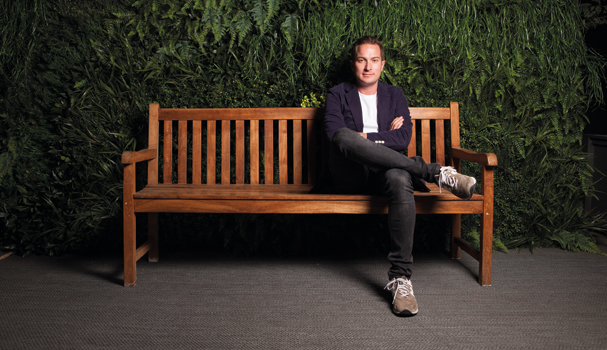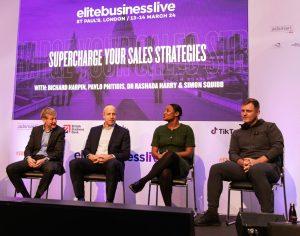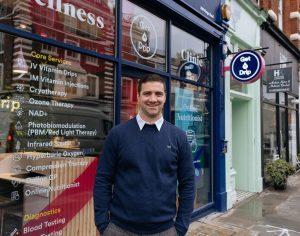There could not be a more appropriate home for DueDil, one of the hottest companies to emerge from London’s thriving fintech scene. A stone’s throw from the biggest financial institutions in the world, its offices mark the intersection between the banking district and the bustling world of start-ups that’s become synonymous with the east end.
It’s safe to say that Damian Kimmelman, the man behind DueDil, won’t be straying any further into the heart of the City. The son of a New York banker was always adamant that he wouldn’t be following in his father’s footsteps. “I hated banking. I knew it wasn’t for me,” he says.
It was clear from a young age that he was not cut from the same cloth as his father or even his sister, Kweilen, who is four years his senior. “She’s very studious and was always the goody two-shoes, whereas I was the one who always got into trouble,” smiles Kimmelman.
Their parents loved to travel so the family would often up sticks and jet off to unusual destinations. These weren’t the average family beach holidays. “We went to places like Papua New Guinea when I was 11, trekking with the Asmats, and to Cambodia during the height of the UN Pol Pot negotiations. We were in South Africa during apartheid and we were staying in a Holiday Inn. There was a bomb that went off outside the hotel and it shattered all of the glass,” recalls Kimmelman.
Whilst he wasn’t too concerned, his mother did not share his carefree attitude. “I thought that I was in a scene in MacGyver [the American action-adventure series] and it was the coolest thing ever. My mum didn’t find it funny that I thought it was cool. I remember her hiding my eyes and taking me down to the basement.”
School was dull in comparison with his holiday-time adventures. “I didn’t really care about going to class,” he admits. “At one school I accumulated something like 700 demerits which had to be a record. That meant that every single weekend instead of going out with friends I was on patrol or sweeping up leaves, which really sucked.”
Whilst his studies failed to hold his attention, Kimmelman loved to read, especially “anything to do with business.” His father gave him some money, which he invested in the stock market. And that wasn’t the end of his early entrepreneurial endeavours. “At my day school I used to get the security guard to buy me Playboy magazines. Then I’d go back home where my mum had a photocopier so I’d Xerox them all in black and white and sell them around the school,” he reports.
But such high-jinks often left him in hot water. He was asked to leave his first boarding school when he was 13 after just a year. Grotton, upon which the Robin Williams film Dead Poets’ Society is based, grated on Kimmelman. “It’s the only school I hated. I absolutely detested it,” he says.
It wasn’t that he was apart from his family for the first time. (Grotton is in Massachusetts, approximately six hours by car from New York, where his parents live.) “I was asking to go,” he laughs. “I just didn’t like the school itself. It was extremely pretentious and everyone thought they were God’s gift to man when they weren’t.”

This reinforced Kimmelman’s conviction that he didn’t belong. “I was always an outsider,” he says. “I was horrible at sports. I was a troublemaker. I was the one who travelled to the weirdest places. I was called ‘devil child’. That was my nickname when I was a little kid. I was born in the same year as The Omen came out and the lead character in that film is also called Damian.”
The next school he attended was a junior boarding school called Eaglebrook. Again, Kimmelman felt as though he were something of an outlier. “I don’t want to talk badly of Eaglebrook because I loved it but it was really for people who had English as a second language, kids from quite dysfunctional families and uber, uber wealthy people,” he explains. “I was certainly the poorest person in my hall. It was crazy wealth but because everybody was so wealthy there wasn’t a sense of needing to show off. Nobody bragged. You’d only realise who they were when their parents would roll up with security guards.”
Kimmelman’s time was cut short at Eaglebrook after an alcohol-related prank. “I got suspended because I thought I was really clever and poured vodka into my camel pack for skiing and I thought no one would check. I was wrong.” By now, his parents were beginning to despair. They suggested he attend Episcopal High School in East Virginia which had a bit more of a flexible approach to the rules. “They said, ‘listen Damian, why don’t you go somewhere where you don’t have to show up to class, where you can just do exams?’ Because I always got good grades, I just never really worked,” he explains. Episcopal was a hit. “I absolutely loved it. It wasn’t extremely academic but people were just very kind and caring.”
Kimmelman got the necessary grades to secure a place at the University of St Andrews in Scotland, where his sister had also studied. Despite never attending a single lecture during his four-year international relations MA course, he achieved a 2.1. “I wouldn’t go again,” he says. “Academia was never for me. I love reading and I went to other people’s classes but something about having to go to something was really stressful to me.”
Kimmelman found other ways to fill his time. He was chosen to organise the opening ball and the May ball. “The opening ball was a massive success – it sold out in a few hours,” he says. He also got involved in the buying and selling of property, netting him a cool £1m as house prices soared. “The Prince William effect meant there were tons of Americans just flocking,” he says.
When Facebook hit Blighty’s shores three years into his degree, initial scepticism soon became excitement. Kimmelman wanted a slice of the action. In search of the next big thing, he and a friend turned their attentions to social gaming. They decided they’d build an online platform for people to play Mahjong, a traditional Chinese game and brought on a third partner to help with the front-end development. But after trips to Macau, Hong Kong and Las Vegas, the trio abandoned their R&D. “If we’d continued, we’d have got into some pretty dodgy territory,” says Kimmelman.

Whilst Kimmelman’s university pal re-entered the academic fray to study for his PhD, Kimmelman invested in the third partner’s business, a digital agency, and they rebranded as We Are VI. “He put £60,000 into We Are VI and I matched him. We went into business together but six months later things were quite dubious. He did some really unsavoury things. I asked my accountant to take a look at the accounts and tell me what’s going on with them. He told me: ‘they’re totally cooked’”.
Shock turned to horror as Kimmelman quickly realised he’d have to make the company’s 25 staff redundant and close the business. But it wasn’t just him that had missed the gaping holes in the company’s accounts: high street bank Barclays had also failed to notice any discrepancies when Kimmelman’s partner had applied for a loan the previous year.
“I couldn’t read the accounts but I also realised that the people in Barclays couldn’t read the accounts either. That was a big eye-opener,” says Kimmelman. It was also the genesis of what was to become DueDil. “This was a real problem but it was also a real opportunity. If so many people – from a young budding entrepreneur to a large organisation like Barclays – couldn’t read the accounts, there had to be an opportunity in that. Because if you can’t read accounts, you can’t price risk and if you can’t price risk then you’re really screwed.”
As his idea began to take shape, Kimmelman went to a TechCrunch conference where he heard a presentation from Eileen Burbidge, a partner at VC heavyweight Passion Capital. “I nervously went up to her shaking and tried to pitch my idea. She was super easy to talk to but I was just so nervous,” he laughs.
The first version of the site was a browser plug-in for LinkedIn where users could give constructive feedback on people’s profiles. It didn’t fly because, as Kimmelman puts it, “it was too much like shit-stirring”. Instead they decided to put data at the core of DueDil’s offering, instead of tittle-tattle.
“I saw that most companies were private. They make 50% plus of GDP across any developed economy. And yet there was no Bloomberg of data,” explains Kimmelman. The business model was different to Bloomberg’s, however. Unlike Bloomberg, it would give the data away for free. “You don’t sell the data. The data’s free. One of our old competitors, who went by the wayside, had a classic quote: ‘data is the new oil’. There’s such a fundamental misunderstanding of what data is in that statement. Data’s not the new oil. And anybody who says so is a total moron because oil is a commodity, data isn’t. Oil isn’t growing exponentially. The reserves of oil aren’t growing exponentially. We’re at peak oil. Furthermore, it’s not a fungible commodity; the price of one data set for one person is different for that same data set for another person. Which is different from oil. With oil, the price is the same no matter where in the world you are unless its subsidised.”

Where DueDil sees it can add value is by layering products and services on top of the data itself. For example, earlier this year it launched v3 DueDil API which helps companies define and qualify customer and prospect profiles, based on filters such as growth rates, location, size, profitability and credit risk.
“The value is not in the data; it’s in the information and insight that’s achieved from that. LinkedIn doesn’t sell people’s profiles, it sells the discovery. It sells the tools on top of the data. And we’ve taken a very similar approach,” he says. “And I think that’s the right one.”
The company’s myriad investors appear to agree. In March this year, DueDil raised $17m in its series B financing round, bringing total investment to $22m in a ten-month period. Alongside Eileen Burbidge, who was the firm’s first external investor, other shareholders now include renowned entrepreneur Tom Hulme and Sherry Coutu, who can only be described as investor royalty.
Does having a gaggle of such widely acclaimed backers heap pressure on the entrepreneur at the helm? He says not. “They’re lovely. I’ve never had a problem with our investors and we’ve had problems as a company – it’s not always been smooth sailing. There have been plenty of times when our investors could have been evil to us but they’ve always been supportive when I asked for help,” says Kimmelman.
What about his other most fervent supporters – his parents? “I think my parents are proud but I don’t think I’m that successful yet. I got an award for international entrepreneur of the year but truthfully we haven’t made it yet as a company. We could as easily be a failure as we could a success – and I’m not saying that in a fake humble way, it’s really true. Success isn’t guaranteed. We’re going up against some huge companies and we’re a little minnow,” he says. “But it’s been a lot of fun so far. And I’m pretty sure we’re going to succeed.” ![]()
Share via:


















































